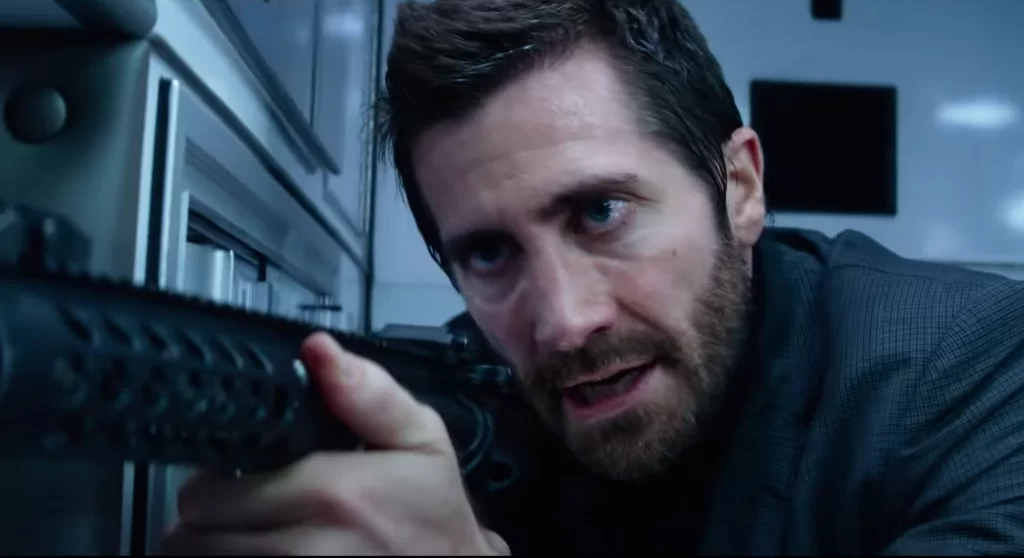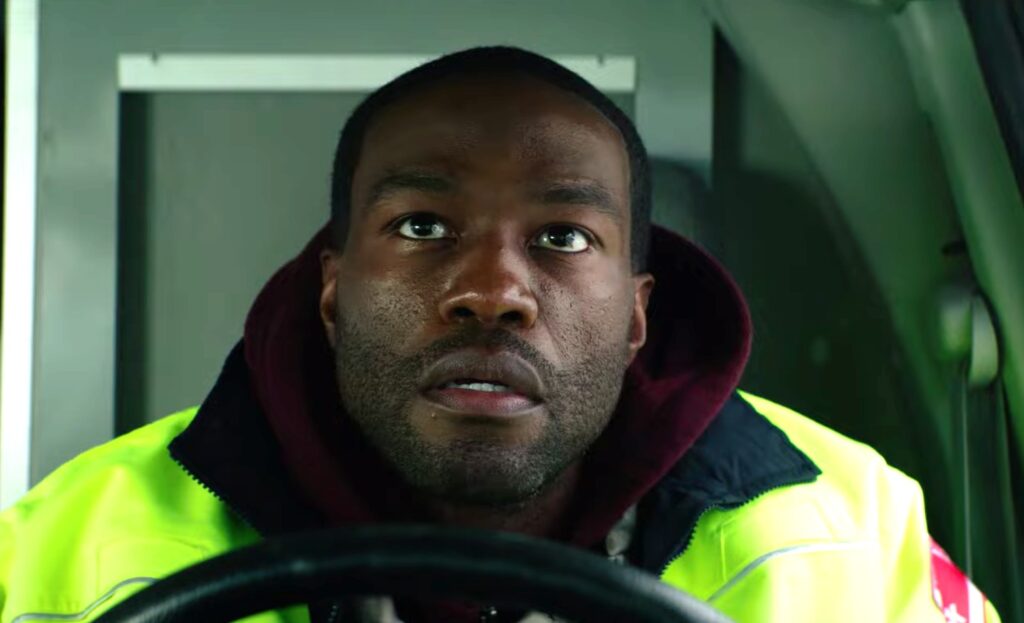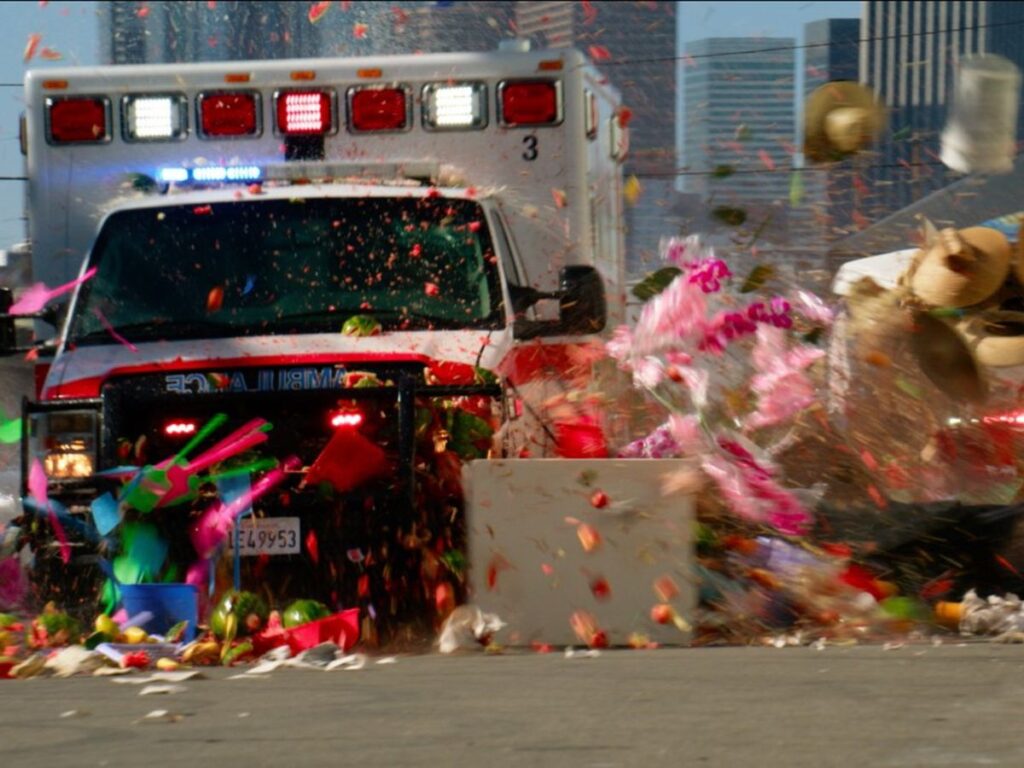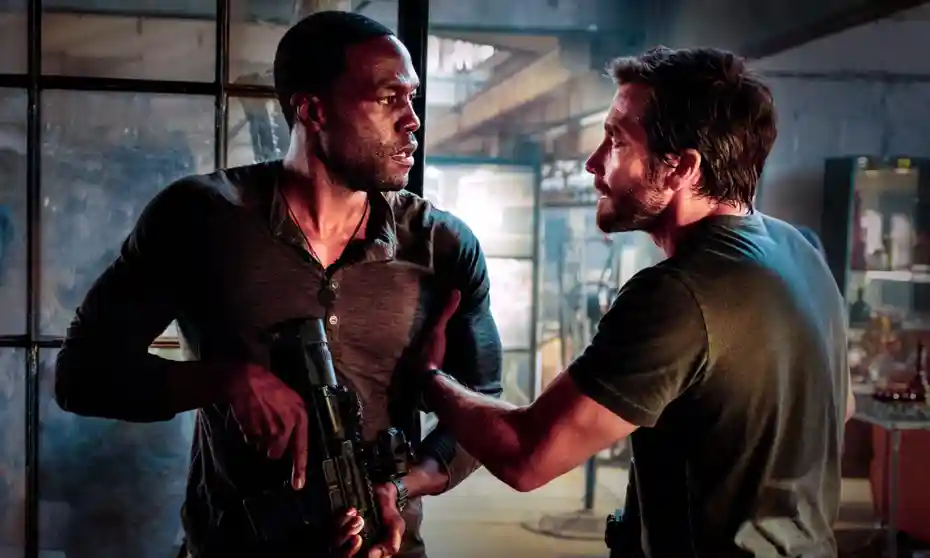
One of the qualities that I prize most in filmmaking is personality. It’s a quality that’s hard to find these days, at least at the multiplex. The exponentially increasing market share of the Walt Disney Company has crowded out riskier, more adventurous big-budget fare, forcing viewers who crave originality and audacity in their entertainment to flee to the art house or the internet. (Fortunately, there are still plenty of good original pictures being made.) So when a loud, brash action thriller arrives—a would-be blockbuster with no ties to any existing franchise, spandexed hero, or comic book—its mere existence is arguably cause for celebration; when its aesthetic bears the unmistakable stamp of its creator, that sense of collective joy should feel even more profound. And yet: What if the artistic personality that’s being so exuberantly flaunted is—for lack of a more precise critical term—bad?
I’m speaking of Ambulance, and more specifically of its director, Michael Bay. His name is perhaps not the first that leaps to mind when you hear the loaded word “auteur,” yet it’s impossible to deny that Bay has spent his lengthy career polishing and refining his own distinctive brand. It even has its own term: Bayhem. His movies represent less a viewing experience than a visual and sonic assault—a vigorous, over-caffeinated cocktail of metallic carnage, swaggering machismo, and militaristic fetishism. They don’t feature human characters so much as avatars of teenage-boy cool; his heroes are cigar-smoking quipsters who just want to have fun, but they’re also physically gifted warriors whose willingness to disregard societal rules in service of the mission purports to lend them a certain moral integrity. The putative story that unfolds around these muscle-bound he-men is merely a mechanism, a narrative device that assists in achieving the films’ true purpose: blowing shit up real good.

Bay, who cut his teeth making music videos before bursting onto the sun-drenched and skin-glistening scene with the 1995 hit Bad Boys, is the owner of a vast and profitable oeuvre, and my familiarity with it is admittedly incomplete; I endured his first nine pictures—one of which (The Rock) I quite liked, the rest of which vacillated between harmless and tedious—before tapping out after his third installment of the Transformers series. (I maintain that Shia LaBeouf, for all of his antics, is a watchable and talented actor; I do not maintain that sentiment when it comes to Mark Wahlberg.) Still, while it’s been more than a decade since my last round of Bayhem, even I could instantly appreciate that Ambulance is very much a Michael Bay movie. There are a great many collisions, cacophonies, and explosions. Characters scream a healthy percentage of their dialogue. There’s a hot chick who’s also tough, because she’s really just one of the manly guys. There’s a little racism (but, like, only a little). There are cornball themes and gallant heroism and phony anguish. Most of all, there is a relentless sense of kinetic momentum, propelled by a frenzied visual style that seems to have been fueled by the premise of the Crank films: If the camera stops moving or cutting, you’re dead.
And that’s the problem. By far the most important thing about a Michael Bay movie is how it moves; Ambulance, like all of his works, moves with a hyperactive chaos that eschews clarity for clamor. It’s a turbulent approach that paradoxically produces a numbing effect. When every shot and sound is turned up to 11, the whole thing just comes off as noise, like an aggravating emergency siren that never stops shrieking.
To be fair, it isn’t as though Ambulance is indifferently directed, as is so often the case with modern actioners that lazily rely on weightless CGI. To the contrary, it has been aggressively directed, to the point where every low-angle shot and sweeping camera pivot and random cutaway drips with authorial intent. Zoom out to the viewpoint of one of the dozen-plus helicopters that chases its four-wheeled brethren, and you can appreciate the obsessive zeal that Bay brings to the production. The movie apparently cost “only” $40 million, and it’s clear that he maximized the budget; operating in a giant sandbox of disposable automobiles and crisscrossing freeways, he smashes countless cars and trucks together, and the mighty clangs carry tangible impact. He also possesses, at least to this East coaster’s knowledge, an intimate knowledge of Los Angeles geography; after all of the Gothams and Sokovias and Free Citys, it’s nice to watch an American movie that’s set in an actual American city.

And yet, none of the vehicular violence unfolds with any wit, precision, or imagination. Again, Bay’s supposed ethos is that he blows shit up real good, but in Ambulance—and, I would argue, in most of his movies—he blows shit up quite poorly. He may have a knack for epic imagery, but his impatience chokes the life out of his frames; he simply can’t resist cutting furiously to as many angles of a scene as possible, and his machine-gun style prevents his constant movement from developing any actual rhythm. It isn’t really a compliment to point out that the speeding titular vehicle—reckless, undisciplined, careening ahead without regard for stop signs or human life—is the perfect embodiment of his filmmaking.
The weird part is that, if you can ignore all of the frantic cutting and hectic swirling and blaring gunfire—i.e., all of the reasons this movie exists—then Ambulance is kind of fun. Technically a remake of a 2005 Danish feature (which neither Bay nor I has ever seen), its gleefully ridiculous plot centers on Will (Yahya Abdul-Mateen II), a rugged and vaguely noble ex-Marine whose insurance refuses to cover his wife’s emergency surgery because, er, bureaucracy. Conveniently, Will’s estranged brother, Danny (an appropriately bonkers Jake Gyllenhaal), is a luxury-car merchant and all-around reprobate who just happens to be planning a bank heist that very day, and wouldn’t you know it, their crew could use one more. Several poor choices and bleeding bodies later, Will and Danny find themselves fleeing from what seems to be half the country’s police force in an ambulance, where they’re joined by Zach (Jackson White), a severely wounded beat cop, and Cam (Eiza González), a no-nonsense EMT who, with her consummate poise and all-business demeanor, is tougher than the two brothers put together.

This is not exactly rocket science; or rather, it approximates Bay’s version of rocket science, like the scene in The Rock where Nicolas Cage launches an unarmed missile into an overconfident foe while sneering, “You’re the Rocket Man.” Still, even if it isn’t quite elegant, there’s a simplicity to Chris Fedak’s script that’s effective, in part for how it efficiently divides the characters into mirroring groups of bullheaded brawlers. Bay has long savored smirking cop-to-cop banter, and he loads Ambulance with jocular investigators, most notably an even-keeled honcho played with effortless charm by Garret Dillahunt. “I like her,” he declares after encountering a mouthy subordinate who plainly knows her stuff, and that spirit of fraternity lends the film a welcome shiver of warmth.
The real attractions of Ambulance, though, reside in the ambulance. Gyllenhaal can be a nimble and nuanced performer when required; here, nuance is not required. Instead, he supplies the movie with its screeching id, bellowing most of his lines and amping up his high-wattage charisma until it bursts, then recharging it and amping it up again. Random, wild line readings like “It’s cashmere!” and “Not the flamingos!” are why you cast an actor of his particular, berserk vintage. Next to him, Abdul-Mateen has the misfortune of playing the surly straight man; aside from a delightful scene where the brothers indulge in some yacht rock, Bay fails to give his co-lead the chance to flex the limber comic muscles he flashed in The Matrix Resurrections. Splitting the difference between these two brawny bros is the very fine González, who manages to imbue her gritty tech with glimmers of passion and intelligence without lapsing into phoniness or sentimentality.

The same can’t be said for Bay himself, who insists on freighting Ambulance’s high-octane excess with fraudulent optimism and absurd hokum. The film’s third act is oddly disgraceful, importing a band of snarling Latinx gangsters to serve as its true villains—despicably cruel thugs whose anti-police bloodlust runs counter to the hidden goodness of our bank-robbing, car-crashing, shotgun-toting heroes. The brotherly bond between Will and Danny, which is the supposed emotional heart of the movie, is somehow both fuzzy and overwrought, while the late handover of a cash-filled backpack is almost brazen in how blatantly it seeks to manipulate the audience’s feelings.
Of course, Ambulance’s thematic drippiness is secondary to its clattering action, which is as unremitting and punishing as in any of Bay’s productions. The happy exception arrives when the pedal-to-the-metal mayhem slows down and gives way to a strangely intimate sequence in which Cam and Will helplessly perform emergency surgery on Zach. (Danny, perhaps serving as a mouthpiece for his director, grumbles that their pursuit has turned into the world’s slowest and stupidest car chase.) Otherwise, though, it’s pure speed, though it lacks Speed’s cleverness and audacity. There’s no question that Michael Bay is at the wheel of this hulking, sprawling leviathan of a movie. Throughout, he keeps steering Ambulance with his decidedly personal flair, sending it zooming past the emergency room and straight into the morgue.
Grade: C+
Jeremy Beck is the editor-in-chief of MovieManifesto. He watches more movies and television than he probably should.
